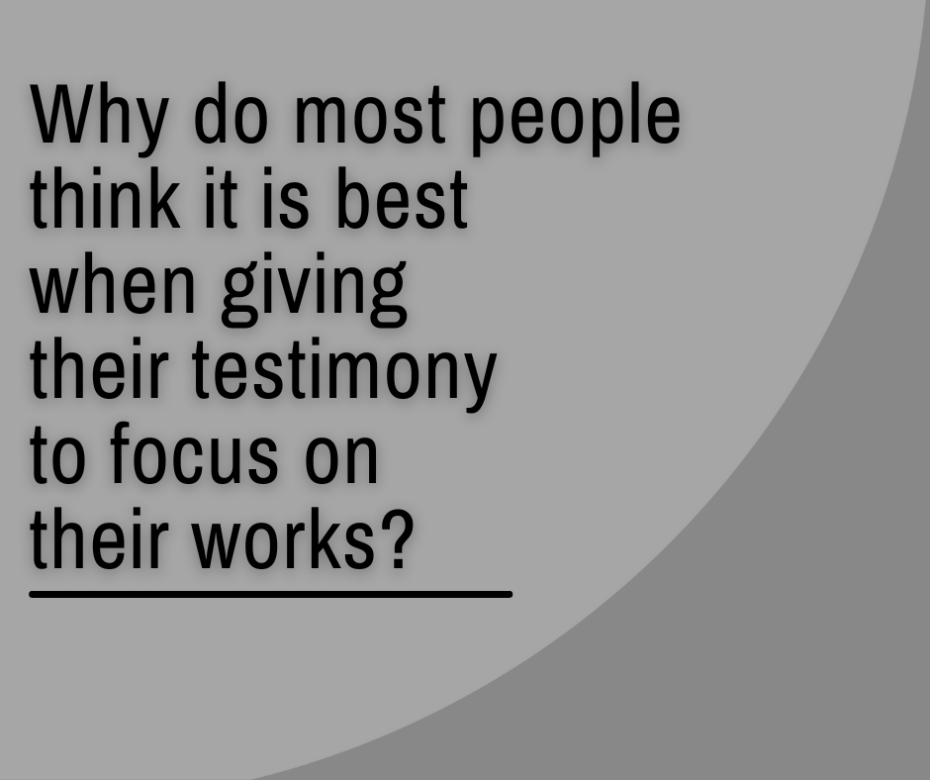Kathryn Wright came to Dallas last week for a women’s conference. She gave a series of messages on how to give a clear testimony.
Prior to her speaking at the conference, Kathryn and I recorded six podcasts about clear testimonies. This blog is an outgrowth of our discussions.
Kathryn outlined the way people are typically taught to give their Christian testimony. It’s a three-step approach that focuses on works. During step one a person explains what their works were like before coming to Christ. The worse the works were, the better the testimony. Drug addiction makes for a nice step one. A life of crime works well, too. The first step sets the stage for step three.
The second step involves a person’s explaining how they came to Christ. Of course, the exact wording of what the person did to be saved varies. One may speak of committing their life to Christ, turning from sins, surrendering to the Lordship of Christ, or pledging allegiance to Christ. Most testimonies include, in the second stage, a promise of a lifetime of good works. Rarely do people speak of when they believed in Christ. Though supposedly about how one came to Christ, stage two actually focuses on works because it focuses on the promise of future good works.
The believer’s current works are on display in part three. Here the testifier indicates how their life changed. Whereas before coming to Christ the person struggled with various sins and addictions, now they are a model spouse, parent, neighbor, employee, and church member. In part three, they imply that their life has been permanently changed by Christ and that they will surely continue on this saintly path until death.i
Kathryn suggested that such a testimony is really a lot more about us than it is about Jesus.
I think she has a good point. Do you agree?
Kathryn and I each then suggested our own three-point testimony format. Kathryn’s is to first talk about what you believed before you came to faith in Christ (step one), what you believed when you came to faith in Christ (step two), and finally, what convinced you to believe that. My suggestion agrees with points one and two but proposes that point three focus on how my ongoing belief in Christ continues to give me joy because I know I am eternally secure.
I really like the contrast between testifying about our faith in Jesus for everlasting life and testifying about our commitment to serve Christ, then enumerating all the good works we’ve done since promising to serve. One focuses on Jesus and on believing in Him for what He promises. The other focuses on me and what I promised to do for Him and how I am following through on my commitment.
Danny Webster, who produces our podcasts, tells me that with these six shows, we now have podcasts through the end of December. Mostly likely, then, around the last week of December you can hear the six shows that Kathryn and I did on testimonies.
If our testimony is to be a part of evangelism, then it certainly needs to talk about what a person must do to have everlasting life. Since the Lord was clear that the sole condition for everlasting life is believing in Him for that life (John 3:16; 5:24; 6:47; 11:25-27), then we must talk about Jesus and His promise to us, not about ourselves and our promise to Him.
The Bible never commands us to tell people how we came to faith in Christ. However, we do have examples like the woman at the well in John 4:28-39 (verse 39 says, “…many of the Samaritans of that city believed in Him because of the word of the woman…”) and like Paul who, in 1 Tim 1:16, described himself as (“…a pattern to those who are going to believe on Him for everlasting life”). Since we are called to tell others about Christ, it makes sense that we might sometimes share our personal story of coming to faith in Christ. But if we do, let’s do just that. Let’s not focus on our works and our commitment to serve Him. Let’s focus on His words and His works and what He promised to give to anyone who believes in Him.
__________
i. Why do most people think it is best, when giving their testimony, to focus on their works? It is because most people believe in some form of Lordship Salvation or works salvation. If believing in Christ really means commitment and obedience, then your testimony will surely talk about those things. Or, if salvation requires both faith and good works, then you will need to talk about faith and good works. The idea that a person is saved by faith in Christ apart from good works is not the view of most people who profess to be Christians.


